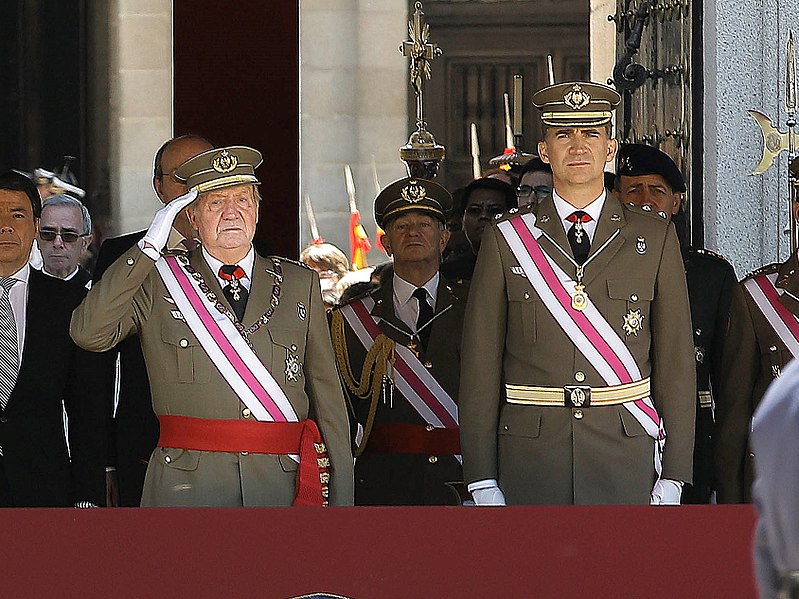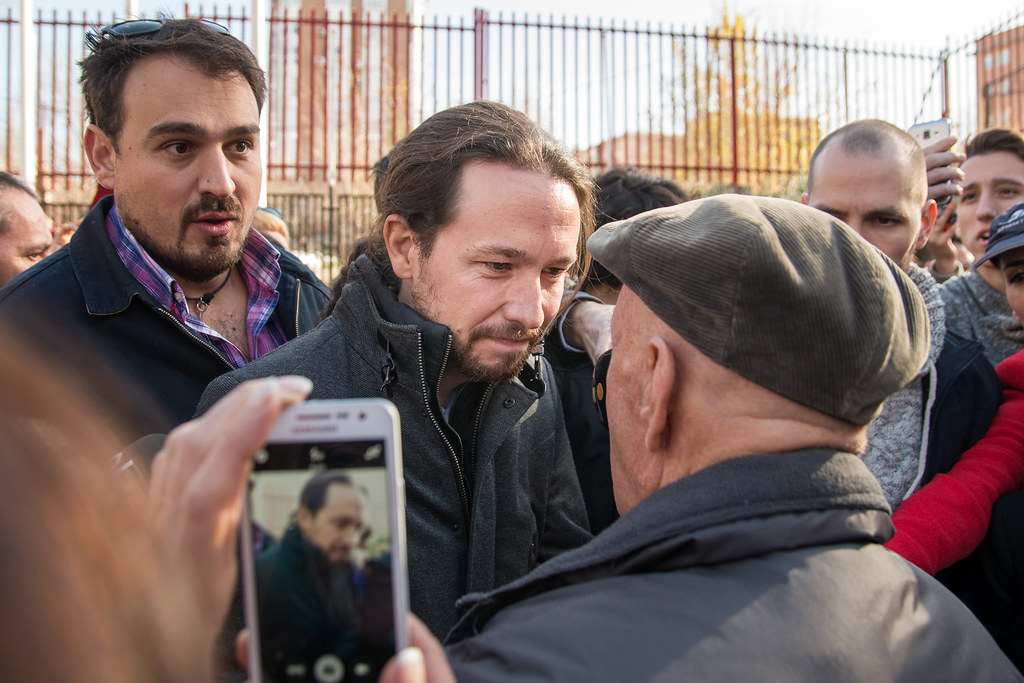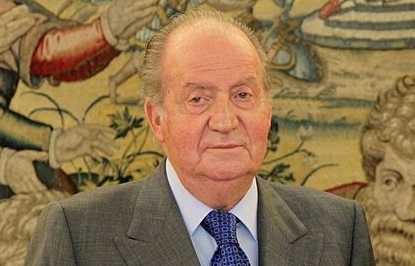On Sunday 2 August, former King Juan Carlos I left Spain for a sumptuous retirement in the Dominican Republic. This drastic move was avowedly motivated by an avalanche of revelations about the outrageous corruption and criminality in which he had been involved for decades. Juan Carlos’ flight was concocted with the current King Felipe VI and the government, led by the PSOE Social Democrats.
Despite assurances that he will still be held accountable in Spanish courts for any illegal activity, his banishment will foreseeably allow him to evade justice. Somewhat embarrassedly, the entire establishment has endorsed this decision, including the mainstream media and the bourgeois parties and personalities. However, the ruling class is not simply concerned about Juan Carlos’ personal fate, but about the future of the monarchy that is the cornerstone of the regime that emerged from the transition to democracy in the 1970s. By spiriting him out to a distant country they hope to deflect growing public anger, but this decision could dangerously backfire.
The Bourbons
Juan Carlos I became king in 1975, a few days before the death of Francisco Franco. He was personally appointed head of state by the dictator and swore loyalty to the principles of the fascist regime. Juan Carlos was born in exile in Mussolini’s Italy in 1938. He is the grandchild of Alfonso XIII, who escaped from Spain in 1931 on the eve of the proclamation of the Second Republic, carrying with him a tremendous fortune. Alfonso and Juan Carlos are not the first Bourbons that have had to abandon Spain in a hurry: Isabel II ran away to France with the outbreak of the 1868 revolution. So did Fernando VII upon the invasion of Spain by Napoleon.
Most of the ruling class under Franco realised the need for managed democratic reform from above to avert revolution from below. However, there existed a variety of positions as to the speed and scope of reform. The king was envisaged as a Bonapartist figure that could smooth over these divisions. The myth was created of a king who had restored monarchy and then saved it during the 21 February 1981 attempted coup. This is the main political function of the Spanish monarchy: to act as a bourgeois strongman in times of difficulty, an “independent” figure apparently “above party politics” to be used in cases of emergency. This impression was vindicated once again in the aftermath of the Catalan referendum on independence, when the masses successfully defied the state and threw the state apparatus and the entire ruling class into disarray. In the evening of 3 October, Felipe VI delivered an extremely aggressive speech on television that energised the Rajoy government and the powers that be and gave them the resolve to stage a major crackdown against the Catalan republican movement.
The king also became the symbolic cornerstone of the transition settlement and the main guarantor of its stability. After Franco’s death, the Social Democratic and Stalinist leadership of the labour movement acceded to the continuation of the Francoist state apparatus, its general legal framework and property relations in exchange for the substandard democratic reforms enshrined in the 1978 constitution. Something had to change so that everything stayed the same, as Lampedusa’s dictum goes. The king, appointed by Franco but donning a parliamentary cloak, crowned this arrangement. Any challenge to the monarchy is correctly interpreted by the ruling class as a threat to the 1978 regime, that is, to the superstructure of Spanish capitalism. By Western European standards, Spanish capitalism is notoriously backward and rapacious and has been challenged many times by the rebellious masses. This has instilled the bourgeoisie with an apprehensive and intolerant mentality and a preference for the stick over the carrot. The figure of the king assuages these insecurities.
Finally, the king wields real constitutional powers, especially in times of political crisis. Although in recent decades these prerogatives have seldom been utilised, there is little doubt that they will be brought into use if the crisis of the 1978 intensifies. Moreover, the king enjoys juridical immunity. As things stand, within the Spanish legal framework Juan Carlos can only be tried for crimes committed after his abdication. It goes without saying that the Bourbon dynasty is also a major economic force that has amassed a tremendous fortune. Its political power and its wealth make it an important broker in the world of business.
The king is therefore no mere decorative figure, but has decisive political importance for Spanish capitalism. Consequently, all revolutionary movements in recent Spanish history have set their sights on the monarchy. This is no folkloric struggle. To mobilise against the monarchy is to challenge the 1978 setup and the capitalist system on which it rests.
Juan Carlos I
All of the major bourgeois parties in Spain extolled the figure of Juan Carlos I. This was especially true of the PSOE Social Democrats. Historically, this has been a republican party. They justified their acceptance of the monarchy during the transition by extolling the personal role of Juan Carlos as an agent of democracy and reconciliation. They conveniently swept his close connections to Franco under the rug. This myth is now in shambles as a series of corruption scandals have fatally tarnished his image. Already in 2014 Juan Carlos abdicated the throne to his son, Felipe VI, after a major scandal over a hunting trip to Botswana. The background to this decision was the growing discredit of the monarchy as an institution in the midst of the mass movements of these years, which also saw the spectacular rise of Podemos as a mass force in 2014 that called for a referendum on the monarchy. In 2015, the public opinion poll institute CIS stopped conducting surveys on the monarchy after years of steady decline in its popularity. When Juan Carlos abdicated, he secured an annual 200,000 euro stipend and retained the honorific title of king emeritus.
 The press is building up Felipe VI as 'incorruptible', unlike his father. But the monarchy is a rotten pillar of the rotten '78 regime / Image: PP, Flickr
The press is building up Felipe VI as 'incorruptible', unlike his father. But the monarchy is a rotten pillar of the rotten '78 regime / Image: PP, Flickr
The recent revelations that motivated Juan Carlos’ defection came not from Spain, where the judiciary and the mainstream media turn a blind eye on the corrupt dealings of the monarchy. They arose from a court investigation in Switzerland about the fortune the former king kept in that country. One of Juan Carlos’ many lovers and high-class prostitutes, Corinna Larsen, described multi-million-euro transfers, the use of diplomatic pouches to bring cash into Spain, and banknote counters in the gardens of the royal palace. The ramifications of this case were echoed by European media such as The Telegraph, that revealed the existence of a 65m euro commission that Felipe VI was entitled to inherit. As far as we know, most of this money came from commissions from business deals between Spanish companies and Middle East dictatorships. This is unsurprising, for Juan Carlos was a good personal friend of tyrants such as Morocco’s Mohammed VI and Saudi Arabia’s Abdullah.
In the spring of 2020, during the COVID-19 crisis, the Spanish media began to timidly echo this news and to publish its own findings. In March, Felipe VI announced he renounced any inheritance from his father and suspended Juan Carlos’ retirement stipend, thus acknowledging the truth of the revelations. In June 2020, the Supreme Court announced it would investigate Juan Carlos’ fortune. This change in attitude was not simply motivated by the findings of Swiss courts or foreign media. Veteran Catalan mogul Jordi Pujol was being tried for corruption. He had fallen out of favour with the regime after his party veered towards pro-independence positions in recent years. Pujol’s asset manager was the same that dealt with Juan Carlos’ wealth. It is likely Pujol knew about the former king’s rackets and attempted to use them to blackmail the court. Similarly, shady police officer José Manuel Villarejo, who is currently in jail for corruption and extortion, had gathered sensitive information on various political figures in order to blackmail them. He had also accrued recordings of the former king’s illicit activities. This impelled the Spanish establishment to change tack on the Juan Carlos affair. He who was once extolled as a champion of freedom and reconciliation and the vanquisher of the 1981 coup, is now a dirty old man with a lisp.
The strategy of the Spanish ruling class is now to draw Juan Carlos away from the public eye and to elevate his son into an incorruptible leader, emphasising the differences with his father. Felipe VI has spent recent weeks travelling across the country in an attempt to increase his popularity. However, he has been welcomed with republican demonstrations in many localities. The problem lies precisely in the fact that Felipe VI is king because he is the son of Juan Carlos, a scion of the Bourbon dynasty. The fall from grace of Juan Carlos also casts doubts upon the official narratives about the transition and about the democratic credentials of the former king. The stark double standards of the Spanish media and the judiciary also raise questions about the supposed impartiality of justice and about freedom of speech. Most ministers of the Catalan government that organised the 2017 referendum are currently in jail or in exile. The terms of their imprisonment were recently made more stringent. The former Catalan president Puigdemont is in exile in Belgium. He was reviled as a coward and a defector by the entire establishment. Rappers Pablo Hasel and Valtonyc were sentenced to jail for songs where they denounce the corruption of the monarchy. Republican sentiments are now on the rise throughout Spain. Juan Carlos’ flight will not help to save the monarchy, it has rather thrown it into its gravest crisis since 1931. It is safe to say the monarchy is hanging from a thread, and the only thing that keeps it from collapsing is the attitude of the ruling left-wing bloc around the PSOE and Unidas Podemos (UP).
UP in trouble
 UP's reaction has been scandalously weak and ambiguous. Strong left-wing leadership and a fulsome condemnation of the vile monarchy and '78 regime are needed! / Image: Adolfo Lujan, Flickr
UP's reaction has been scandalously weak and ambiguous. Strong left-wing leadership and a fulsome condemnation of the vile monarchy and '78 regime are needed! / Image: Adolfo Lujan, Flickr
When Podemos was created in 2014, it stood in radical opposition to the 1978 regime. This allowed the new party to become very popular. However, Pablo Iglesias and the other leaders of Podemos (later UP) gradually watered down their programme. Their rhetoric became more moderate. This turn to the right eventually culminated in the formation of a coalition government with the PSOE. The Social Democrats are closely connected with the ruling class and with the regime. Their social function is to sugar the pill of cuts and attacks against the working class with empty left-wing rhetoric. Pablo Iglesias’ coalition with the PSOE was a mistake that severely curtailed UP’s right to independent criticism. They became co-responsible for the government’s inaction and pro-bourgeois policies. The current economic crisis and the difficulties brought about by the pandemic further narrow the room of manoeuvre of the coalition government. UP performed very badly in recent regional elections in Galicia and the Basque Country, where they lost hundreds of thousands of votes to left-nationalist parties, which are seen as more radical and are not tainted by direct participation in the government. Although these results cannot be mechanically extrapolated to the rest of Spain, as the national question weighs heavily on Galician and Basque politics, they still reflect the fact that UP is no longer perceived as a radical option at a time of hardship and discontent when millions are looking for alternatives.
Pedro Sánchez and the PSOE sense the growing discredit of the UP and are increasingly dismissive of their quarrelsome junior partners. They unilaterally entered into negotiations about a new government budget with the liberal party Ciudadanos, without involving UP. More ominously, PSOE ministers prepared Juan Carlos’ flight without informing Pablo Iglesias, who avowedly found out in the newspapers. It goes without saying that the PSOE backed this decision and stands firmly on the side of the monarchy. The UP ministers are now striking a very ambiguous chord. On the one hand, they denounce Juan Carlos’ desertion and demand he be held accountable for his crimes in Spain. On the other hand, they warn that this episode is a worrisome blemish for Spanish democracy and for the head of state, that is, for the monarchy. In other words, their main concern is that the king’s flight will discredit the 1978 regime. They have made very ambiguous noises about “starting a social debate about our political system”. These half-hearted insinuations are outrageous at a time when bold leadership for the republic could deliver a fatal blow against the monarchy and the entire regime.
The problem is not that Juan Carlos de-legitimises Spanish democracy, but rather that “Spanish democracy” is so rotten that the head of state has fled to the Caribbean carrying a fortune with him. If UP is still worth its salt, Pablo Iglesias and his fellow ministers should break with the government immediately and call for mass mobilisations not only for a referendum on the monarchy, but openly for the republic, linking this to the broader struggle for democratic reforms and social justice. However, in light of their recent behaviour this is extremely unlikely, and UP seems doomed to follow the fate of the 1978 regime. Spanish workers and youth cannot wait for such cowardly leaders to take the initiative. It is the time to take to the streets and settle scores with the corrupt Bourbon monarch and with the neo-Francoist 1978 regime.

